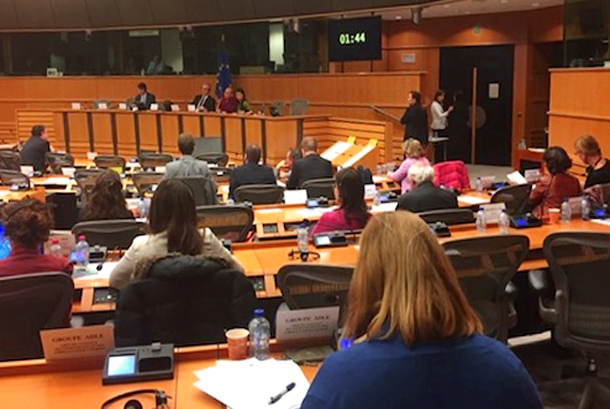 Brussels — Golog Jigme, a former Tibetan political prisoner, told the European Parliament Subcommittee on Human Rights (DROI) on Tuesday that Tibet has become like a large open-air-prison under Chinese occupation. Ven Jigme was severely tortured for assisting Dhondup Wangchen in making the documentary "Leaving Fear Behind" in 2008.
Brussels — Golog Jigme, a former Tibetan political prisoner, told the European Parliament Subcommittee on Human Rights (DROI) on Tuesday that Tibet has become like a large open-air-prison under Chinese occupation. Ven Jigme was severely tortured for assisting Dhondup Wangchen in making the documentary "Leaving Fear Behind" in 2008.
Ven Jigme testified before the European Parliament's Subcommittee on Human Rights in Brussels, the de facto capital of Europe, on March 15, 2016. The Tibetan filmmaker and human rights activist was invited by the Committee to testify on the deteriorating human rights situation in Tibet.
"I was born in a nomad's family in Eastern Tibet. I am a non-violent freedom fighter. I am a human rights defender. I am a filmmaker. I made a documentary called Leaving Fear Behind. Because of this, the Chinese authorities arrested and tortured me," he said as he began his testimony.
He was imprisoned three times and tortured by the Chinese authorities for making the documentary Leaving Fear Behind and for involvement in March 2008 peaceful protest in Labrang. After his first arrest in 2008, he was tortured by the Chinese authorities for 51 days.
"Once, they hung me forward with my back against the chair," he said. "Both my ankles were shackled below the chair's seat and wrists shackled on the chair's small metal table. My feet were not touching the floor. It was like hanging on the chair. The weight of my whole body was borne by my shackled ankles and wrists. This made me feel that my chest was going to split into two and all my intestines were going to fall onto the floor. I became very dizzy and could not see properly."
The Chinese security officials beat him on his back with tiny metal sticks, kicked him and gave him electric shocks in his mouth. "The pain the chair caused when they hung me was too extreme to feel any of the pain caused by the metal sticks or the kicking. When they gave me electric shocks, I could feel nothing. I could only smell the burning of my own flesh," he said.
The pain of thirst was the second worst torture for him. Due to heavy loss of blood during torture, "I felt like I was dying from thirst. I was only given a very small amount of water. Over time, I got used to hunger and sleep deprivation, but never to being thirsty," he said.
He was arrested for the second time in 2009 and again in 2012. Fearing for his life during the detention in 2012, he managed to escape in the middle of the night. While he was hiding in the mountains, he learned that the Chinese police had put out a warrant for his arrest for murder, which he never committed.
"Tibet has become like a large open-air-prison under Chinese occupation," he said. "I escaped from this prison. I came to a free country. My body is in a free country but my heart will always remain with the suffering of my Tibetan brothers and sisters. When I think about what they go through, there is not a single day I feel happy being in a free country."
He thanked the European Parliament and requested the Parliament to call on China to impose a moratorium on the settlement of Tibetan pastoral nomads and to allow diplomats, parliamentarians and journalists, free access to Tibet. Finally, he called on China to improve the living conditions of the over 2,000 Tibetan political prisoners currently in Chinese prisons who have been detained and sentenced for peaceful expression of views or non-violent dissent and for their immediate release.
He also appealed for the release of his friend Shokjang, a young Tibetan writer and blogger sentenced to three years in prison on 17 February 2016 after he wrote a blog post about an intense build up of Chinese security forces in the Rebkong area.
Speaking on China's new counter-terrorism law, he said it gives an even larger scope for the penalization of almost any peaceful expression of Tibetan identity, acts of non-violent dissent, or criticism of ethnic or religious policies.
Mr T?kés László, a senior member of the Subcommittee on Human Rights chaired the hearing. Dr Joëlle Hivonnet of the European External Action Service (EEAS) said in his statement, "We were humbled by his (Golog Jigme) testimony. It is important for us to hear first hand information."
Since his 2014 escape from Tibet, Jigme is meeting with parliamentary members and NGO leaders in the European countries, highlighting the need to continue raising awareness over human rights situation in Tibet.
On March 14, Jigme had met the Council of the EU's Working Party on Human Rights (COHOM) and the Asia-Oceana Working Party (COASI) Chairs, as well as officials from the European External Action Service (EEAS).
"I know what it is to live under Communist rule because I grew up in Romania," said Mr. László in his concluding remark.
Jigme had a detailed meeting with Amnesty International, Human Rights Watch and International Federation for Human Rights Tuesday morning. In the evening he spoke to the member of the Tibet Interest Group in the European Parliament and "Leaving Fear Behind" documentary was screened.
He is visiting Brussels to share first-hand account of his experience in a Chinese prison and his way to freedom. His visit was jointly organised by the International Campaign for Tibet and Bureau du Tibet, Brussels.
Jigme was listed by Reporters Without Borders among the list of "100 Information Heroes" on World Press Freedom Day, in 2014.


![Tibet has a rich history as a sovereign nation until the 1950s when it was invaded by China. [Photo: File]](/images/stories/Pics-2024/March/Tibet-Nation-1940s.jpg#joomlaImage://local-images/stories/Pics-2024/March/Tibet-Nation-1940s.jpg?width=1489&height=878)















